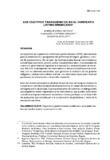| dc.contributor.author | Nemogá, Gabriel Ricardo | |
| dc.contributor.author | Chaparro-Giraldo, Alejandro | |
| dc.contributor.author | Keyeux, Genoveva | |
| dc.date.accessioned | 2018-04-09T18:38:53Z | |
| dc.date.available | 2018-04-09T18:38:53Z | |
| dc.date.issued | 2007 | |
| dc.identifier.citation | Nemogá, G. R., Genoveva, K., & Chaparro-Giraldo, A. "Los cultivos transgénicos en el contexto latinoamericano (Transgenic crops in the Latinamerican context)." Revista Pensamiento Jurídico, 18 (2007): 127-146. | en_US |
| dc.identifier.issn | 2357-6170 | |
| dc.identifier.uri | http://hdl.handle.net/10680/1462 | |
| dc.description.abstract | La expansión de organismos modificados genéticamente (OMG) plantea retos para la conservación y apropiación del patrimonio biológico, genético y cultural de Latinoamerica. De un lado, las multinacionales buscan incrementar su rentabilidad ejerciendo presión en los tratados bilaterales y multilaterales de comercio, pretendiendo legitimar la biopiratería y monopolización de recursos. Del otro, la apropiación de conocimiento y una actitud política comprometida con los intereses nacionales, que garantice la inclusión de los pueblos indígenas y demás comunidades étnicas, son elementos claves para resolver
problemas de alimentación y desarrollo sostenible. Este documento sustenta la posibilidad de salir de esta encrucijada mediante la cooperación científica fundamentándose en la ética, el desarrollo económico y el respeto por la diversidad. Expresa el esfuerzo de construir un diálogo entre investigadores dando importancia a las coincidencias que pueden suscribirse cuando se anteponen intereses nacionales e invita a participar en el desarrollo de posiciones que contribuyan a la comprensión de problemas y retos de la revolución científica. / The proliferation of genetically modified organisms (GMOs) presents challenges for the conservation and management of Latin America’s biological, genetic, and cultural wealth and diversity. On the one hand, multinational companies aim to raise their profits by influencing the content of bilateral and multilateral trade agreements, attempting to legitimize biopiracy, and monopolizing resources. On the other hand, policies committed to defending national interests,
incorporating the knowledge possessed by traditional communities into the decision-making process, and guaranteeing the participation of indigenous people and other ethnic communities are essential to solving the problems of food supply and sustainable growth. This paper advocates the possibility of resolving this tension through scientific cooperation that emphasizes economic development respectful of biological and cultural diversity. The authors encourage dialogue between researchers, highlighting the common ground of
national interest. Such a dialogue can greatly contribute to the understanding of the problems and challenges associated with the genetic revolution. | en_US |
| dc.description.uri | https://revistas.unal.edu.co/index.php/peju/issue/archive | |
| dc.language.iso | es | en_US |
| dc.publisher | Revista Pensamiento Jurídico | en_US |
| dc.rights | info:eu-repo/semantics/openAccess | |
| dc.subject | Organismos genéticamente modificados | en_US |
| dc.subject | propiedad intelectual | |
| dc.subject | biodiversidad | |
| dc.subject | conservación in situ | |
| dc.subject | Genetically modified organisms | |
| dc.subject | intellectual property | |
| dc.subject | biodiversity | |
| dc.subject | in situ conservation | |
| dc.title | Los cultivos transgénicos en el contexto latinoamericano | en_US |
| dc.type | Article | en_US |

